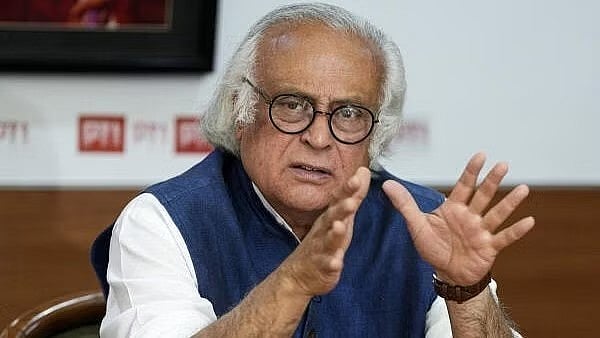
Jairam Ramesh.
Credit: PTI File Photo
New Delhi: The Congress on Tuesday hoped that Prime Minister Narendra Modi will "finally agree" to a discussion on China in the forthcoming Monsoon session of Parliament, and said that when Parliament could debate the border situation during the 1962 Chinese invasion then why not now.
The opposition party also stressed that it is essential to build a national consensus on the critical security and economic challenges arising from China's rise as the world's leading manufacturing power and its position as the second-largest economy.
Congress general secretary in-charge communications Jairam Ramesh pointed out that in his July 14 meeting with China's Vice President Han Zheng, External Affairs Minister S Jaishankar stated that the India-China bilateral relationship "has been steadily improving since the meeting between Prime Minister Narendra Modi and President Xi Jinping in Kazan last October" and that "continued normalisation of our ties can produce mutually beneficial outcomes".
"Perhaps we should remind the EAM of recent developments in bilateral ties since the PM's last tete-a-tete with President Xi: China gave total support to Pakistan during Operation Sindoor, turning it into a testing ground for network-centric warfare and weapon systems such as the J-10C fighter and PL-15E air-to-air missile and assorted drones," he said in a statement.
Deputy Chief of Army Staff Lt Gen Rahul R Singh has stated that India fought three adversaries in Sindoor, including China that gave Pakistan "live inputs" i.e. real time intelligence on Indian military operations, Ramesh said.
Pakistan is likely to acquire Chinese J-35 stealth fighters in the near future, he pointed out.
China has restricted exports to India of critical materials like rare-earth magnets, speciality fertilisers, and tunnel-boring machines for infrastructure projects, Ramesh said.
Important sectors like telecoms, pharmaceuticals, and electronics remain critically dependent on Chinese imports, even as the trade deficit with China reaches a record USD 99.2 billion, he said.
Ramesh said hundreds of Chinese workers have departed from India's Foxconn facilities, potentially impeding India's attempt to become an alternative global supplier of Apple smart phones.
When are the External Affairs Minister and Prime Minister Modi going to take the people of India into confidence and hold a detailed debate on China in Parliament -- as the Congress has been calling for since 2020, he said.
The Congress hopes that the prime minister will finally agree to such a discussion and break the five-year drought in the forthcoming Monsoon session of Parliament, Ramesh said.
"If Parliament could debate the border situation in November 1962 when the Chinese invasion was at its peak, why cannot we discuss now, especially given that both sides appear to want renormalisation (albeit without necessarily restoring the May 2020 status quo on the Line of Actual Control in Eastern Ladakh)?" the Congress leader said in his statement.
It is essential to build a national consensus on the critical security and economic challenges arising from China's rise as the world's leading manufacturing power and its position as the second-largest economy, one that may well surpass the United States within a decade, Ramesh said.
His remarks came a day after Jaishankar, during his talks with Yi, said India and China should build on "good progress" in normalising bilateral ties to address border-related issues, including de-escalation, and it is essential to avoid "restrictive trade measures and roadblocks".
Jaishankar also held talks with Chinese Vice President Han Zheng and conveyed to him that continued normalisation of bilateral ties can lead to mutually beneficial outcomes.